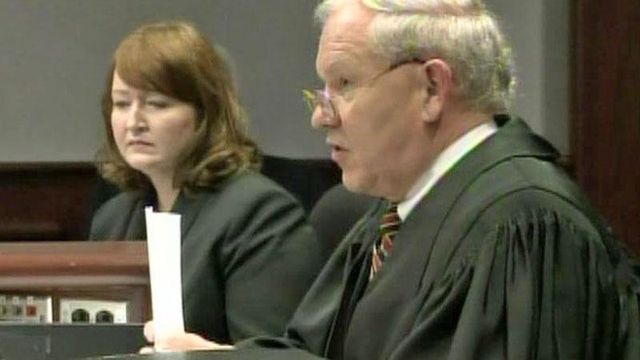Judge opens hearing on state budget cuts' impact on schools
A North Carolina judge is reviewing the state's $19.7 billion budget, other recent state legislation and what's happening in the state's classrooms as he watches whether every child is getting the chance for a sound basic education.
Wake County Superior Court Judge Howard Manning Jr. held a hearing in Raleigh Wednesday to review the impact of the state budget taking effect next month on the basic educational rights guaranteed to each North Carolina child under the Constitution.
Manning has said that educational opportunity for every child must persist despite the state's budget shortfall and a difficult economy.
Preliminary test scores from the just-completed school year show that about 200,000 North Carolina students in grades 3 through 8 were are not reading at grade level, Manning said. That's out of about 678,000 students in those grades who were tested, the state Department of Public Instruction said. The state's public schools have about 1.5 million students.
"What's not happening in the classroom is what this case is focusing on, because it's the right of children to receive a sound, basic education," Manning said. "If a child cannot read, if they are not literate — whether they can do math on a computer or not — they're not going to make it."
The judge is considering arguments by lawyers for Hoke, Robeson, Vance, Halifax and Cumberland counties that the budget passed last week over the veto of Gov. Beverly Perdue undercuts gains made since a landmark 1997 state Supreme Court decision. That ruling said every child has a constitutional right to an education that allows them to compete for a job or higher education and to be a functional citizen.
Manning was put in charge of ensuring that basic education rights are delivered. The judge said when ordering Wednesday's hearing that the state's economic straits are no excuse for shortchanging any North Carolina child.
Speaker of the House Thom Tillis, R-Mecklenburg, said he believes the judge is overstepping his role.
"If Judge Manning wants to vote on the budget, he should run for office as a legislator. While I respect his opinion on judicial matters, it appears that this is an attempt to literally legislate from the bench," Tillis said in a statement.
The state's high court ruled in the Leandro case, named for one of the plaintiffs, that it's not up to judges to determine the constitutionally required level of spending on education. But the court said students should be offered the opportunity to gain the knowledge and skills they need in language, math, history, economics and other subjects.
Manning said he did not plan to issue an immediate ruling after the hearing, which continues Thursday.
Former Chief Justice Burley Mitchell wrote the Leandro ruling and named Manning to monitor whether legislatures and governors are providing equal educational opportunity. He said it is unlikely Manning will try to rewrite the state's education funding decisions. If Manning finds state officials are violating the constitutional right to a sound education, he may direct them to come up with a plan to fix the problem and report back to the court, Mitchell said.
"He's going to go very slow and with the greatest reluctance," said Mitchell, who is now in private practice. "It depends entirely on what the hearing before him shows."
House Speaker Thom Tillis questioned the reason for the hearing, arguing again that the Republican-written budget protects funding for every teacher and teacher assistant position in the state.
"If Judge Manning wants to vote on the budget, he should run for office as a legislator. While I respect his opinion on judicial matters, it appears that this is an attempt to literally legislate from the bench," Tillis, R-Mecklenburg, said in a statement.
Manning heard testimony from four witnesses who described the lost funding, flexibility, and schoolhouse positions contained in the state budget taking effect next month, coming on top of two earlier recession-battered years of state funding cuts. Cumberland County Schools will have to eliminate 379 positions this year, including 10 assistant principals and 130 teachers cut so far, said Frank Lopes Jr., the district's associate superintendent for business operations.
"The majority of the state budget (cut) is going to be personnel," Lopes said.
Manning is particularly looking at decisions to change the More at Four pre-kindergarten program. A 2004 Supreme Court ruling found that North Carolina's constitutional education rights include providing pre-kindergarten education for children who are at risk of falling behind their peers.
The General Assembly this year cut the program's funding by 20 percent and transferred its operations from the state's education department to the health department. The state budget also limited the number of at-risk children in the program to 20 percent of the total and required that most parents co-pay for the program. The state budget would revamp More at Four into a subsidy for private pre-school providers.
The co-pay requirement will block the state program from adding to federal funding for the Head Start program, further reducing the reach of state efforts to reach at-risk four-year-olds, said John Pruette, who oversees both programs within the state Department of Public Instruction.
Manning asked whether the remaining funding used to subsidize private pre-school slots could keep the same standards and continue to reach about 31,000 children.
"The math just doesn't work, quite frankly," Pruette said. "The resources won't be there. The standards will not be able to be maintained in the program."












